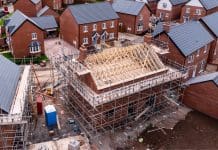Summer ecological surveys from the ecological consultancy EPR supports 70,000 new homes and green infrastructure schemes for Southern England
EPR have announced they are currently providing ecological expertise in relation to a record number of major housing schemes throughout England. This work, undertaken on behalf of both developers and Local Planning Authorities, will play a critical role in enabling the delivery of projects amounting to around 70,000 new homes in aggregate, currently being proposed through Local Plans, in planning or already under construction.
Encouragingly, these projects are collectively accompanied by thousands of hectares of proposed new ‘green infrastructure’. These initiatives recognise the important, multi-functional role of green open space in providing new and improved habitats for wildlife, spaces for people to enjoy the recreational and health benefits of the natural environment, and opportunities to foster more effective future environmental stewardship.
With a number of large-scale housing and green infrastructure schemes under development throughout Southern England, including thousands of new homes across Surrey, Kent, Hampshire, Berkshire, around London and the West Country, extensive ecological impact mitigation is essential to steer these projects successfully to completion.
The months between April and September are the busiest time of the year for providers of ecological surveys and advice as the optimum period for a number of the more challenging species to assess, including protected species such as the barn owl, great crested newt, grass snake and bats. This season, EPR has carried out surveys spanning in excess of 5,400 hectares of land to inform the planning process for around 70,000 proposed new homes in England.
Alison Hogan, Director at EPR, commented: “This has been an exceedingly busy season for EPR and all the ecologists are working hard to meet multiple deadlines within the windows of the ecological calendar. The demand for ecological surveys is a promising sign for the state of the UK housing market and testament to the commitment of developers to take seriously their responsibilities to protect and enhance the natural environment in conjunction with their projects.”
The importance of biodiversity and habitat conservation is increasingly being recognised as a priority in plans for housing development, and the role of ecological surveying and assessment is crucial in taking planning to the next stage and meeting Britain’s housing demands in a sustainable manner.
If ecological surveys are not completed within the deadlines of the ecological calendar, or if proposals for ecological mitigation, compensation and enhancements are not informed by robust environmental information, projects are at risk of being delayed. As Britain’s housing demands continue to increase, providing the best quality of species and habitat survey is vital to ensure that plans meet policy and legal requirements, and enable large-scale planning proposals to be accelerated – particularly where they themselves propose to deliver significant ecological enhancements and new areas of wildlife habitat.














